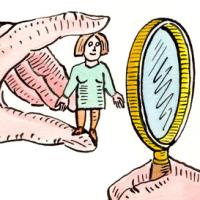
More ‘healthy’, ‘positive’ and ‘real’ representations of women in the fashion world and beauty advertising?
Last month Australia’s Federal Minister for Youth, Peter Garrett, announced a government initiative to address ”negative body image” amongst young women.
Over the last number of years there has been growing awareness and concern about the impact the beauty and fashion industries have on the body expectations of women. The overwhelming response to this has been to demand more ‘healthy’, ‘positive’ and ‘real’ representations of women in the fashion world and beauty advertising.
This new initiative follows this trend by promoting a voluntary industry code and an awards competition for those who include “healthy body image” in their products and marketing. Those who decide to participate may receive a certificate. The assessment panel will be headed by the editor of Australian Women’s Weekly, a beauty and lifestyle magazine.
Aside form the absurdity of leaving such concerns in the hands of those who directly profit from creating insecurities about body image amongst women, the very focus of the initiative is distorted.
The increasingly popular calls for women to “embrace our curves” in the face of skinny models and narrow media representation, just further highlights the overwhelming emphasis on body shape in relation to women’s issues.
Are we similarly being encouraged to embrace the fight against sexism, domestic violence, workplace discrimination and sexual harassment? Many women who have experienced such things would respond with an emphatic “No!”
An obsession with body image, weather it be ‘unrealistic’ or ‘healthy’ bodies, simply serves to limit the idea of womanhood and women’s issues to superficial physicality, often framed around ideas of “sexiness”.
The use of the term ‘real women’ in relation to body shape or size implies that whoever does not fit into a certain physical form is somehow lacking in the qualities that make them authentic women. Are breasts, hips, or any other physical attribute really the defining feature of a woman? What about mastectomy patients, intersex women and transgender women? Are they not ‘real women’?
It is this very idea that a ‘real woman’ can be defined by body size or shape is what needs to be challenged. Rather than replacing the ‘skinny’ ideal with a ‘curvy’ ideal, we need to work towards shifting the focus off women’s bodies and onto the role of women in society. Representations of women will never be ‘healthy’ unless they are inclusive of factors beyond physical appearance or physiology.
However, such a shift will never be initiated or voluntarily taken up by industries built upon profiting from body obsession. It many cases it is in their business interests to market towards a broader range of body shapes and sizes, and accommodate a larger array of women into their product lines.
By appearing to be onboard the shift towards inclusiveness of differing bodies they are able to benefit from a sense of good will from these new consumers. All the while they maintain the model of offering beauty ‘solutions’ to women that centre around shape, size and appearance. In other words, this approach encourages the continuation of exploiting women’s bodies for profit.
A recent study into the attitudes of young women in Australia found that 96 per cent “would change their body if they could”. However, at the same time, when asked what attributes they consider make someone beautiful, the top six answers were “confidence, happiness, good personality, friendly, fit, being healthy and intelligence”.
Rather than focus on initiatives that can help develop these attributes in women – for instance education, training, accessible childcare, community programs etc – government and industry prefer to focus on women’s issues within the confines of the beauty industry.
The idea that feminism should be primarily about making ‘ordinary’ women feel attractive and sexy serves only to limit the aspirations for genuine gender equality. Women have struggled for over a century to achieve rights, recognition and opportunities that go far beyond our physical attributes. We must not let the big business interests of the beauty and fashion industries co-opt what it means to be a woman and what type of representation we should fight for.


Be the first to comment